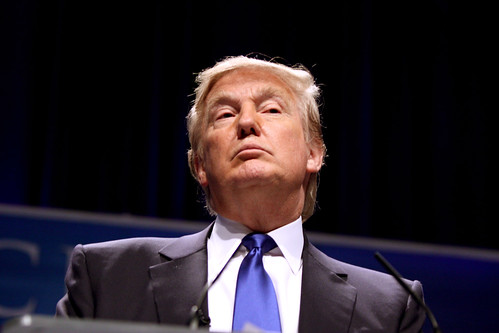Reprinted from www.facingsouth.org
President Trump has said he wants to "totally destroy" the Johnson Amendment, which bars charitable nonprofits from engaging in partisan politics. (Photo by Gage Skidmore via Flickr.)
For years, conservative evangelicals have been advocating for the repeal of the Johnson Amendment -- the section of the U.S. Internal Revenue Code that prohibits charitable nonprofits from endorsing or opposing specific political candidates -- claiming it infringes on their free speech rights.
They have found a key ally in President Donald Trump. Several times during his campaign, Trump made statements opposing the policy. And at the National Prayer Breakfast held earlier this month, he pledged to "get rid of and totally destroy the Johnson Amendment and allow our representatives to speak freely without fear of retribution."
The amendment was introduced as legislation in Congress in 1954 by then-U.S. Sen. Lyndon B. Johnson, Democrat of Texas. Johnson was running for re-election and his millionaire opponent, Republican rancher-oilman Dudley Dougherty, was endorsed by a conservative nonprofit group that was producing materials calling for Johnson's defeat. In response, Johnson proposed amending Section 501c3 of the federal tax code governing nonprofits to require that charitable organizations sidestep partisan politics in order to maintain their tax-exempt status. Uncontroversial at the time, the amendment became law on Aug. 16, 1954.
In making their case that the amendment infringes on their free speech rights, conservative evangelicals have cited the civil rights movement and how leaders like Rev. Dr. Martin Luther King Jr. often preached political messages from the pulpit. For example, Tony Perkins of the Family Research Council, a charitable nonprofit, released this statement following Trump's remarks at the National Prayer Breakfast:
Dr. Martin Luther King -- the greatest 'political pastor' in the nation -- spoke forcefully from the pulpit about how the issues of the day were to be driven by pastors and the people in pews. For the whole of American history, churches have been at the forefront of shaping debate and public policy. That's where they ought to stay. Pastors should be held accountable to God alone for what they say behind the pulpit, not the IRS.
But the history of the civil rights movement shows that the Johnson Amendment does not prevent religious leaders from tackling political issues. During the movement, the Black church -- particularly in the South -- was a hub of civic engagement. It was where mass meetings and planning for direct actions were held, and where Black ministers preached messages criticizing policies that deprived many Southern Blacks of voting and labor rights. And in fact, current law gives churches the liberty to criticize or support officeholders and speak out on policy issues. Additionally, religious leaders can endorse candidates in their individual capacity.
Furthermore, it's extremely rare for churches on either side of the political spectrum to lose their tax-exempt status under the Johnson Amendment. Since 2008, for instance, the anti-gay conservative group Alliance Defending Freedom has organized "Pulpit Freedom Sunday" in which pastors across the country preach partisan sermons and mail the transcripts to the IRS. Though over 2,000 pastors have participated, the IRS has only investigated once -- and did not revoke that church's tax-exempt status.
So why is the Johnson Amendment being targeted? Follow the money, its defenders say.
Since donations to churches and other charitable nonprofits are tax-deductible and protected from public disclosure, repealing the amendment would lead to an influx of secret money into elections. Donors would be able to anonymously contribute to a church or other nonprofit, and that money could then be used to fuel a political campaign without having the donors' identities revealed -- and they could receive a tax deduction as an added bonus.
"It could effectively turn churches into campaign offices and pastors into party operatives," said Robert P. Jones, CEO of the Public Religion Research Institute.
(Note: You can view every article as one long page if you sign up as an Advocate Member, or higher).






